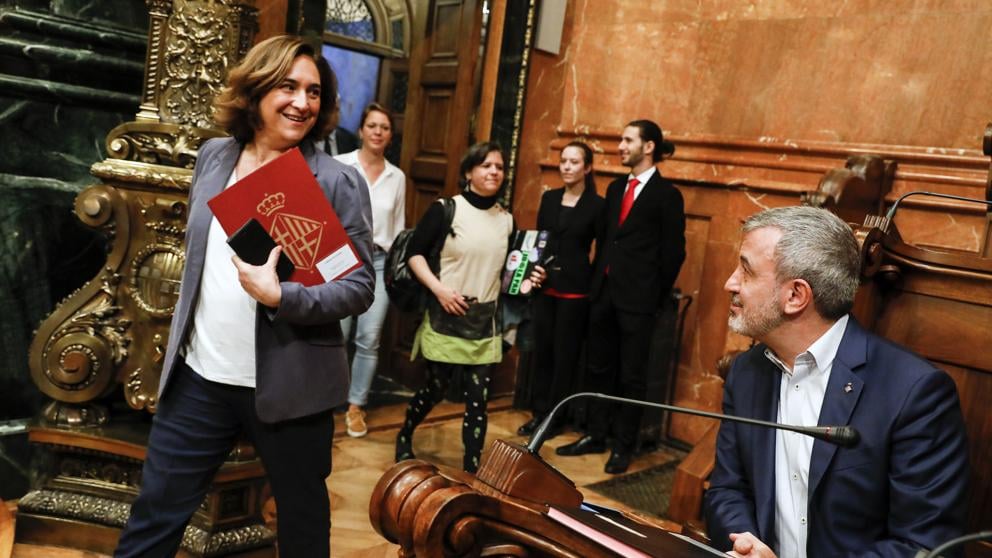Analysis
Colau keeps Barcelona, and Madrid goes to PP with help from Vox
The Catalan mayor Ada Colau accepts the support of Manuel Valls to remain in her seat, while the capital changes hands.

As of Saturday, every Spanish city has a newly installed mayor. According to Spanish law, the municipal councils must meet 20 days after the vote and elect the mayor: either a majority of councilors chooses a candidate, or the leader of the group that got the most votes takes up the position.
In Barcelona, incumbent mayor Ada Colau secured a majority in the council vote and remains the most important “change” mayor still in office, set to lead Barcelona for another four years.
After her attempt to build a three-party coalition involving Barcelona en Comú, the Socialists and Esquerra Republicana (which, under the leadership of Ernest Maragall, got a little more votes than Barcelona en Comú) failed, Colau had to choose between two alternatives: either give up her position to Maragall (with or without a coalition deal), or agree to accept the support of former French Prime Minister Manuel Valls, who has broken with his party, Ciudadanos, and who announced that in order to avoid having a separatist (Maragall) elected as mayor, he would offer the votes of his group to Colau.
Faced with enormous pressures before these two unpalatable alternatives, Colau decided to have her party members vote: 70% voted for her to serve as mayor for another four years, swallowing the bitter pill of relying on Valls. Forty percent of party members took part, around 4,000 people, an all-time high in terms of participation. Two years ago, 3,800 party members voted to break the alliance with the Socialists as a result of the support of the latter for the suspension of the autonomous government of Catalonia.
Many who voted for accepting Valls’ support reasoned that the system of city government is very “presidential,” as the role of the mayor is central in making decisions: even though Maragall had offered Colau important positions during the negotiations, it would have been very different with him in charge. Only at the last moment, as the vote was ongoing, did Maragall dangle the possibility of him and Colau taking turns as mayor, but it was too late. (“This proposal has never been put forward before,” Colau said.)
Similarly, in Madrid, Ciudadanos tried to convince the PP to divide the four-year mayoral term into two alternating two-year terms, but the PP angrily rejected the proposal. In the end, there was a coalition agreement in support of the PP’s José Luís Martínez Almeida, replacing the incumbent Manuela Carmena (whose list had received more votes). The votes of the Vox group were also necessary to seal the deal, who in return got the guarantee of having visibility in the municipal government.
Alongside the coming and going of old and new mayors, this week saw new balances of power emerge. In many autonomous communities which voted to elect new local parliaments, new coalitions agreements have been reached.
For example, Valencia was the only community where the coalition deal between the Socialists and the forces further left (Podemos and Compromís) was renewed. In Madrid, which has been ruled by the PP for three decades, the three right-wing parties reached an agreement to keep the PP in charge of this key community. In others (such as Castilla La Manca or Extremadura), the Socialists got an absolute majority, while in others they had to find outside support.
While municipalities had a legal deadline by which to finalize the coalition deals, this is crucially not the case for the autonomous communities, and, most importantly, for the central government. In the background of all these local negotiations lies the looming question of Pedro Sánchez’s government: no one questions that he will be the prime minister, but the coalition formula is not yet clear.
Apart from the disagreements with Podemos on the role that the latter would play in the future government structure, there remains the fact that the PSoE would also have to get a few more breakaway votes or benefit from key abstentions to win at least the second investiture vote, for which they will need a simple majority. With the support of Podemos and the Basque nationalists (if such a deal is achieved), Sánchez would have just 171 votes (out of 350). The ideal scenario in this case would be the abstention of the Esquerra Republicana group (15 deputies), but the tensions connected to the pending trial against the separatists makes an agreement difficult.
Besides, the magistrates of the Supreme Court—which the leader of Izquierda Unida, Alberto Garzón, on Saturday described as “a wild, out of control and ultra-nationalist power”—have prevented Esquerra leader Oriol Junqueras from taking possession of his seat in the European Parliament. Their reasoning is built on dubious premises, since just a month ago they did not prevent him from assuming his seat in the new Spanish Congress; however, if he were to become an MEP, his position in Brussels would offer him a level of immunity that being a deputy in Spain does not, which would be a thorny problem for the Spanish courts.
Furthermore, there is also the issue of the four deputies (one of whom is Junqueras) and one senator who are currently in prison: neither the Chamber nor the Senate have sought to set up a procedure to allow them to vote or delegate their vote. The anomalous situation arising from the Catalan question continues to loom large over the Congress in Madrid.
Originally published at https://ilmanifesto.it/colau-si-tiene-barcellona-madrid-al-pp-con-i-voti-di-vox/ on 2019-06-16
